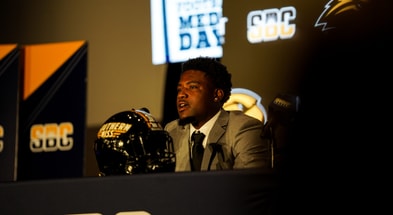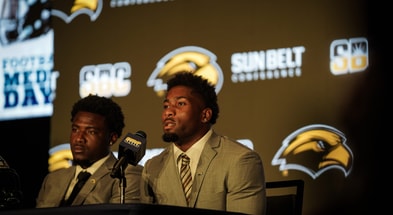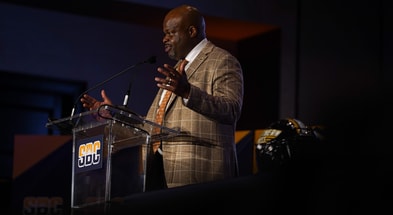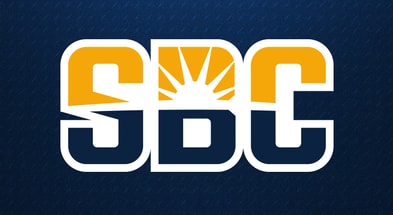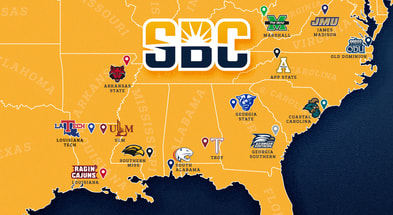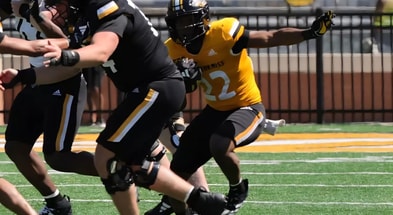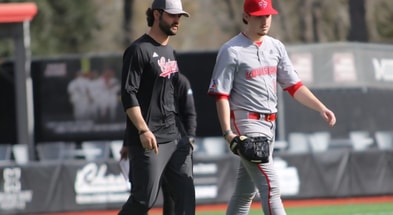Q&A with new Southern Miss Assistant Coach Gunner Leger
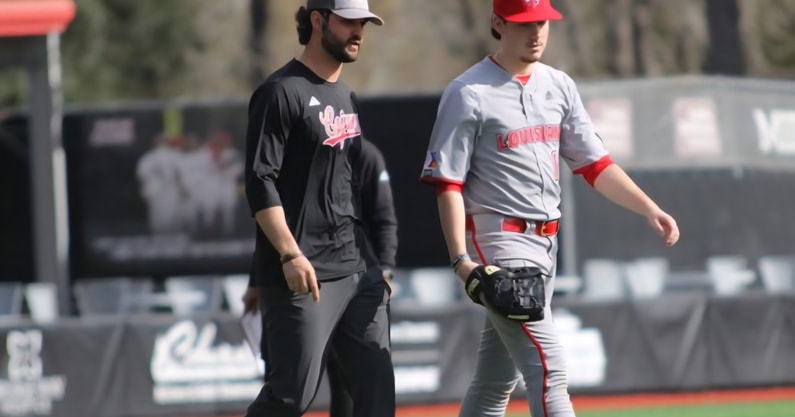
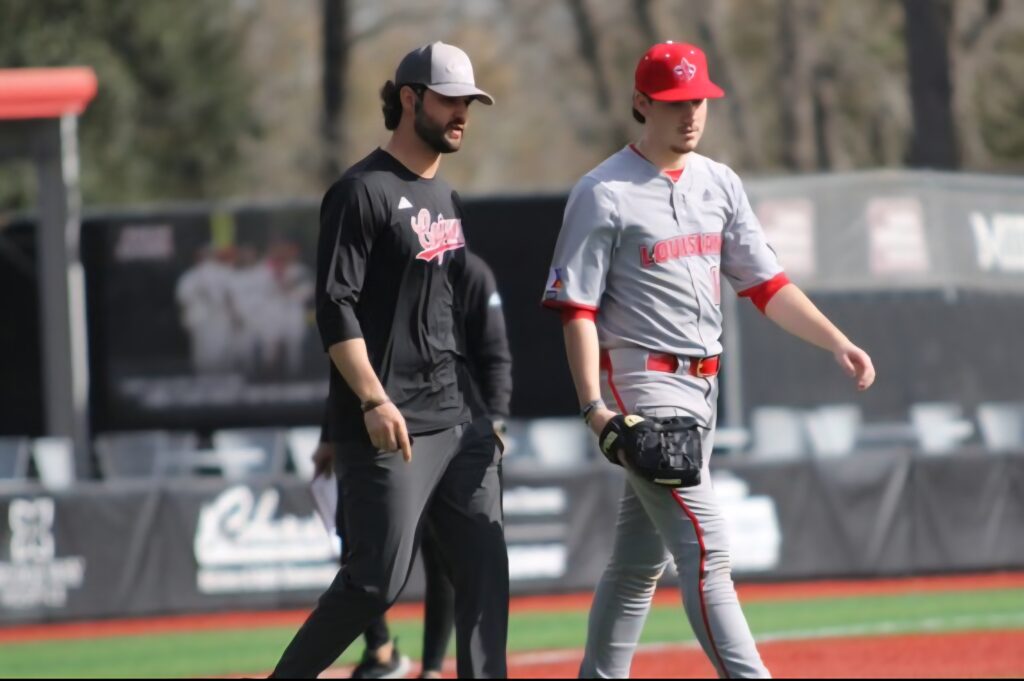
Southern Miss announced on the hiring of former Louisiana Pitching Coach Gunner Leger.
Leger was gracious enough to take a frew moments and answer some question for the members of BGN.
Thanks to Devin Witson for the transcription of the interview.
Heath: Coming to Southern Miss after being at Louisiana, did you call the pitches? How will that adjustment be like with Coach Ostrander calling the pitches here, will that be a big of a adjustment for you?
Gunner: Yeah I did. I handled that at Louisiana. Me and Coach Oz have had discussions about all that and it’s not going to bother me in the slightest. Coach Deags did a great job allowing me to do my thing and was still involved with the decision making, but my communication with Coach Oz is where I want his input and value being able to be alongside him and learn and grow with him and from him. That was a big part of the interest in this place and once the interview took place, the ball started rolling a little bit, outside of who he is as a person and as a man and the things that I heard from him and heard about him, obviously he is one of the best pitching coaches in the country. So I think for me the ability to be alongside somebody that’s at that level and that caliber and learn from him. This is obviously his pitching staff and his baseball team, so I’m just here to add as much value as I can and also learn and grow at the same time.
Heath: I don’t know how Louisiana does their recruiting budget with NIL, but I know that Southern Miss puts a big emphasis on pitching. How big was that in the decision to come to Hattiesburg where you’re gonna have some money to go out and get guys and maybe retain guys that you may not have been able to in the past?
Gunner: Yeah I think more than that, again for me I have to go back to Coach Oz and just the history of him developing pitchers and getting guys better. Obviously that’s been a long time at Southern Miss and I think for a long time at Louisiana too. I was lucky enough to play for Coach Rowe and been apart of that and even before that going to his baseball camps and doing things like that. Like I’d said, I was kinda from right around there so I grew up around that university, around that program, and around the Roubeaux family, so I think there’s a long history of both. For me I wouldn’t say the money had anything to do with it, Coach Oz, Ladd, and Creel have done such a good job with recruiting, evaluating, and developing that I think there’s a lot of alignment in my head and Coach Oz’s head with getting young high school arms and developing them and doing those things right and obviously dipping into the portal some. I think that if you look back into the history of the program, the recent history has a lot of homegrown guys, high school guys that they get in here, hold onto for however many years, and in 3-4 years they leave here better than they got here. That model to me makes sense and that’s kinda what’s always been preached to me growing up and watching my dad doing his job and dealing with roster management and things like that, navigating resources, so I think it was more of that, being able to have similar ideas of development and roster management.
Heath: You look at what Kellar Bradford did, he was here for a couple of years as an assistant pitching coach, and now look where he’s at Liberty, how much do you see him making that jump there also play into you coming here? What are you hoping to learn from Coach Oz?
Gunner: I think for me, obviously being in this for only two years, going into my third was very lucky with my relationship with Coach Deags and got an opportunity and he kinda stuck his neck out there for and gave me an opportunity to be the full time pitching coach when maybe the resume and everything else didn’t really point to that and I’m very grateful for that and I think for me Coach Oz really is one of the best pitching coaches in the country and has a long history of developing men and elite pitchers and getting guys drafted and getting them to the next level. I think for me it’s more of understanding that four year window and that three year window if you will. When they get here as high school kids from practice planning to organization, anything down to a scripted bullpen, or whatever it may be, just in my conversations with him I feel like that we see things similarly and I think we talk the same language so I think it will flow very well together very quickly. I think for me being able to see the whole picture, his ability to know that even when a kid gets in as a freshman that he’s this, to know what we can turn him into that. And again, having done that over and over again with guys and really see that process play out, I think his knowledge and his experience will help me a ton.
Heath: Oz always talks about how he’s cerebral in his approach to pitching and even coaching, are you like that too?
Gunner: Yeah, I would agree with that. I think that my playing history and who i’ve played for they’ve all viewed the game that way as well and that’s how I was coached growing up. I think ultimately that was who I was as a player. At least, on the mound control the game, read swings, look at box adjustments and tag that old school pitch ability, which to some extent has been lost in the modern age of pitching and the modern age of baseball. There’s numbers, there’s cameras there’s all the things you see when you get on social media and TV and you watch a game now. I think at the grassroots of it the game of baseball was played the same way for a long time and there’s a reason for that. I think that Coach Oz, his ability and his superpower a little bit, is something he’s bended and adjusted a little bit but you know the system he has works and there’s a way to go about it and it’s proven. I don’t want to say he is sticking to his guns but he understands what that looks like and like I said earlier, understands that we’ll get this kid in as a freshman. He’s gonna look like this, he’s gonna have these intangibles, and have these things we like and we’re gonna have confidence that we can get him to this next level. Whether it’s a year, two years, three years, however it may be, and he knows what that plan and that process should look like.
Heath: Can I ask you from an opposing standpoint, you came to Pete Taylor Park to coach and as a player, can you talk about how it is? What is it like to play in? Is Pete difficult?
Gunner: Yeah. As a player I came here, Southern Miss was not in the Sun Belt at that time so it was majority midweek games, we would come up here and play on Tuesday or Wednesday and then go off if we had a road trip or whatever that may be, so I experienced it a couple of times. My only experience on the weekend or in maybe some more high leverage games would be this past season when I came down here with Louisiana. I would definitely say it is a tough place to play. I think sometimes, you know the misconceptions early, you can get some mean and nasty comments and you can get some things but that happens at Louisiana too, but I think from my two experiences, I think that the Pete is a special place. In my two real experiences, I think the cool thing is that they understand ball. They know when to cheer and when not to cheer. They understand what is happening in the game and that there’s an expectation of winning and they’ll give you a little bit, but it is a very special place, and a very special city that shows support for its school.

